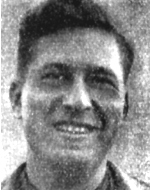Troyne, Edward-Leonard
Son of Malka and Moshe, was born on October 27, 1926, in New York City. He was educated as a complete American, with no connection to Jewish nationalism. Only bits of words in Yiddish remained in his mouth as a memory of the ancestral heritage. Edward graduated from high school and completed civil aviation. During the Second World War he served in the American Air Force in Europe, and his shocking impressions of his meeting with the surviving Jewish survivors in the DP camps and the German cruelty that afflicted them aroused in him the feeling of blood and fate sharing with his Jewish brothers, who were abandoned to slaughter and disgrace for being stateless. Since then he has decided to fight and sacrifice even his life in order to obtain a homeland for the Jews. When he was released and returned to America, he contracted for nine months to serve as a civilian instructor of aviation mechanics and engineering in the US occupation army in Japan. Due to his good temperament, he bought many friends in the army and among the inhabitants; And the family of a Japanese dentist liked him so much that she went on a correspondence with him even after he left and took upon herself to observe the memorial service every year on the day of his death, as is the case with family members. When he finished his service in Japan, he returned to continue his high studies in America. When he heard about the war in Eretz Israel and about the difficult situation of Israel because of the enemy’s aerial advantage, he sought and found the connection in the underground and offered his service to the IAF. He did not listen to his mother’s pleas and warnings of the danger and set out with a group of volunteers. They were arrested and arrested in Rhodes and sent back through Italy. In Rome, the American authorities were warned not to intervene in the Israeli war, as they were liable to punishment for violating the “embargo” law and the loss of American citizenship. One of the group was impressed by the warning and returned home. The remaining passengers traveled to Czechoslovakia and from there they arrived in Israel on planes purchased by the Israeli Air Force. Here he devoted himself to the service of assembling and repairing aircraft and training in technical work, thus contributing invaluable contribution to the Israeli Air Force in its early stages of striking blows at the enemy. In the meantime, the telegrams from home were beating him over his mother’s illness. On July 4, 1948, he invited a Tel Aviv phone call to his father in New York so that they could talk. When he explained to his father the urgency and great importance of his work for the Israeli homeland, his father agreed to stay here and reassured him about the mother’s health. Near the start of the second truce, when he finished his work and was free to stay in Tel Aviv, he volunteered to go on a combat flight. Was shot by the enemy and transferred unconscious to the hospital in Haifa. On the 19th of Tammuz 5708 (19.7.1948) he died of his wounds and was transferred to eternal rest in the military cemetery in Haifa. In a letter to his parents, which was in his pocket ready for shipment, he announced that immediately after the start of the truce he would return home on the first ship.
